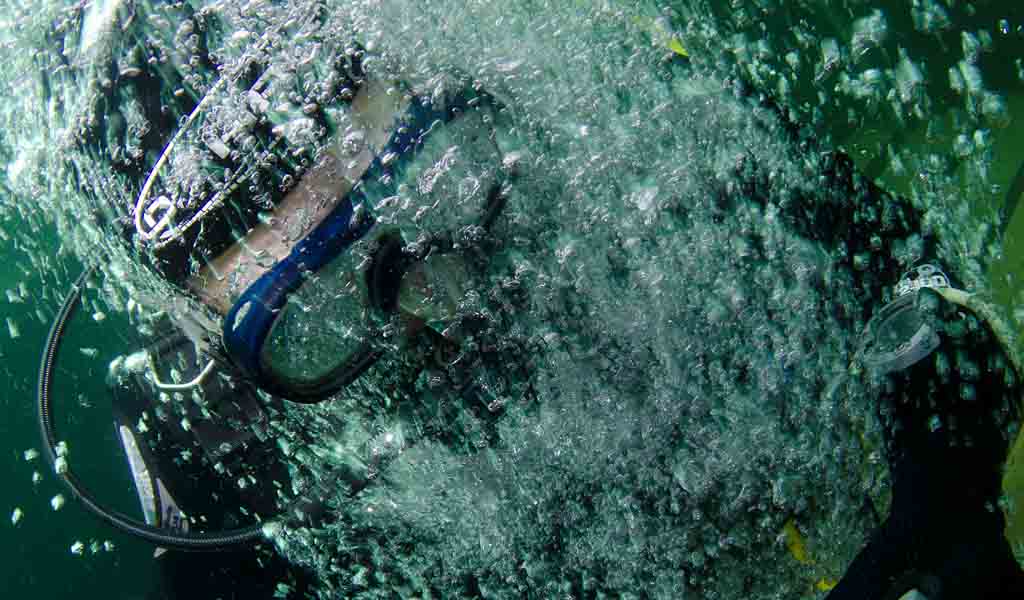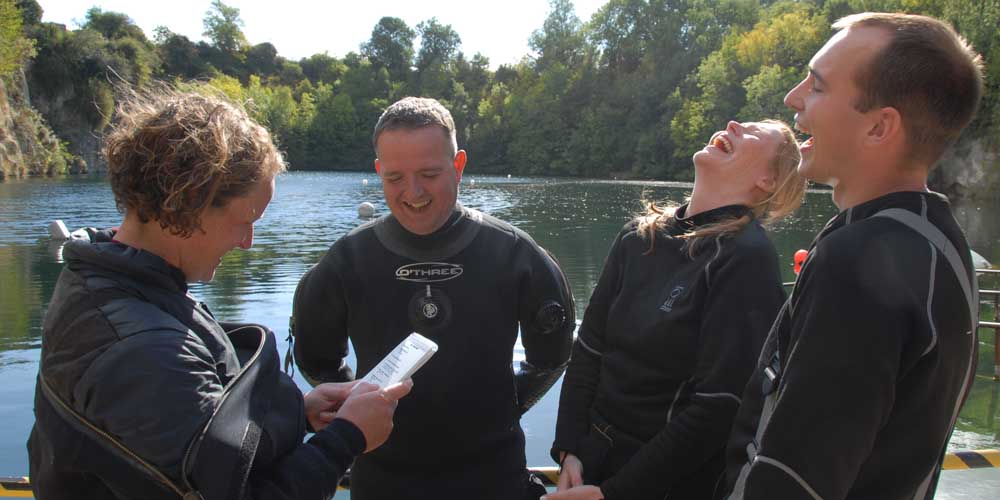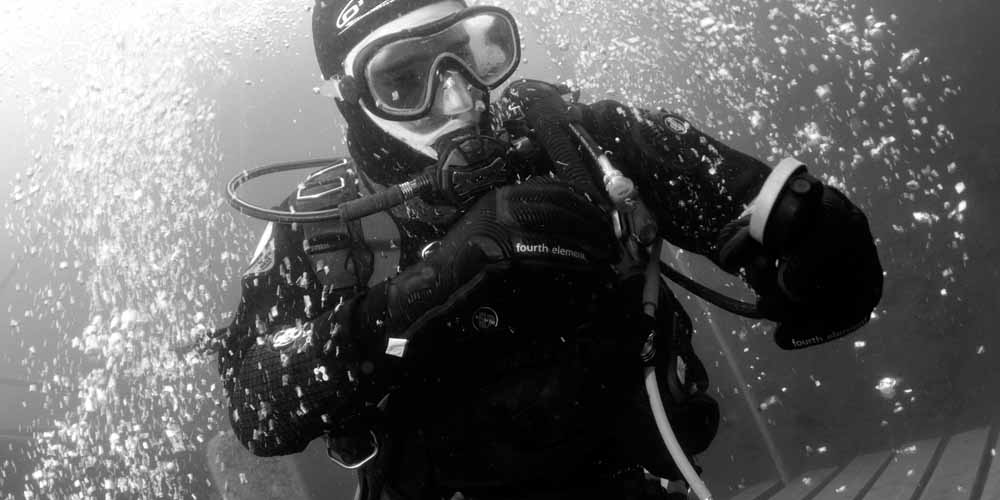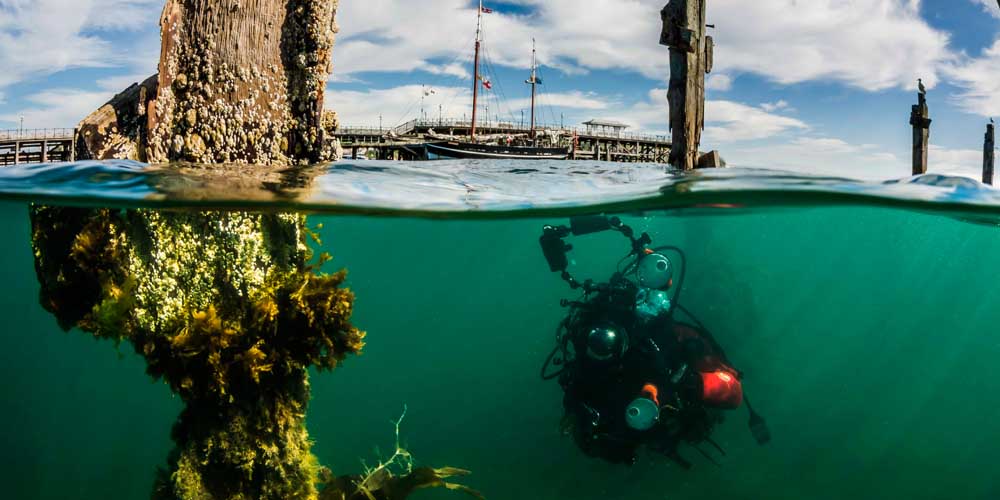
BSAC Advanced Diver training is essential for Dive Leaders who want to organise diving to places they’ve not been before, or Open Water Instructors who want to become Advanced Instructors. Louise Whitehouse, BSAC National Instructor, has nine tips on mastering the Advanced Diver qualification.
1. Motivation
Taking on (or at any rate completing) BSAC Advanced Diver is a substantial challenge. I know several people who have got partway through several iterations of the syllabus, deciding each time that they didn’t really want to do it, so knowing why you want to achieve it will help maintain your focus.
I started Advanced Diver because I wanted to be Diving Officer of our branch. As a student branch, we didn’t have many experienced divers and certainly not many Advanced Divers, so I decided to get it done so I could support the branch better. It was a lot of work and meant pushing myself to organise trips to new places, but it gave me some great experience and put me in a good position to organise a hoard of students for the next three years.
So, whether you’re motivated purely by personal development, or building experience to reach the next step, understanding your own reasons for working on Advanced Diver is a big help.
2. Have a plan
If you want to make it through to completion of Advanced Diver, then it’s good to have a plan. Some lessons need to be taught by Advanced Instructors (AIs) and you also need to plan and organise diving for yourself and others, so identify a tame AI and involve them in your development. If your branch doesn’t routinely run all of the lectures, get them scheduled and invite others to join in.
Alternatively, look at options within your local region or at other local branches nearby. There might be lectures planned there, or you may be able to use the network to make contact with a local Advanced Instructor to work with you. Advanced Diver is the first diver qualification where it’s you that really needs to drive the process. If you don’t pester instructors or organise the diving, then things won’t happen. That in itself is a good step towards becoming an Advanced Diver – you will become one of the people in the branch who makes things happen.

What is a BSAC Advanced Diver?
An Advanced Diver is defined as a diver who is comprehensively trained, experienced and responsible and who can manage and supervise:
- a wide range of adventurous and challenging diving activities
- branch diving expeditions to explore unfamiliar locations
- branch diving activities including dives utilising developing technology and techniques
3. Brush up your skills
Most of the practical skills covered in Advanced Diver should be very familiar and things that you can easily carry out on any dive without a thought. If that isn’t the case, then practising is essential. At Advanced Diver level, you have hit serious role model status, you need to be confident in the water in a range of conditions and confident leading less experienced or confident divers.
There are some skills that you may not have done before; if you haven’t done Lifesaver Skill Development Course, such as rope throwing and a swimming rescue then make sure you find some time to practise. Rope throwing can be a great group activity in the car park, getting everyone in the branch involved and teaching them something new can be a valuable opportunity to master something yourself.
4. Be adventurous
As part of Advanced Diver you need to act as Dive Manager on five occasions. This means picking a site, planning the activities, recruiting some divers and making everything happen. Some of these need to take place at unknown locations, which means sites that you haven’t dived at before.
It can be tempting to pick somewhere relatively straightforward, somewhere that the branch is familiar with, but that you haven’t visited yourself, which is fine and will provide everyone with some great diving. However, for at least one of the activities (possibly the one over two days) choose something different. Pick a site that you’ve always wished someone else would organise diving, and do it yourself. The satisfaction of taking everyone somewhere completely new is incredible and the challenge of planning everything from scratch will really build your confidence in terms of planning diving activities in the future.
5. Do some diving
As a minimum, you need to do 20 dives after completing your Dive Leader qualification, but the more you do, the more confident you’ll feel taking on the role of an Advanced Diver. By being an Advanced Diver you will be seen to be one of the most experienced (if not the most experienced) diver in your branch, so it’s important that you have enough actual experience to back that up.
Ask yourself:
- Would you feel confident advising people about their dive plans and the risks involved?
- Would you feel confident being the person that needs to tell other people that they shouldn’t get back in the water?
The more diving you do, the more experience you’ll have to put into these situations and the more confidence other people will have in your opinions and decisions.
You also need to think about the range of diving that you do. It isn’t necessary to go deep and dark with lots of decompression to become an Advanced Diver, but you do need to do more than just a weekly plop in the local quarry.
Flick through your logbook and see which conditions and types of diving you’ve done since completing Dive Leader. You’ll need to cover planned decompression, dives in tidal waters and drift dives at least three times each within your experience dives. As a regular diver, you can very easily find yourself well on the way to achieving the range of conditions needed and then it’s just a case of targeting the gaps. Make use of the Instructor Manual to clarify what you need to do for a dive to count. Take this example from the manual:
Planned decompression dive - dive involving at least two planned decompression stops, of a total of at least 6 minutes, using an appropriate equipment configuration and decompression technique.
The keyword here is "planned"! Jumping in, having a lovely dive at 35m and then looking at your computer to realise you have a significant time hanging at 6m, does not count!

The Advanced Diver course consists of the following elements:
- four classroom lessons
- a theory assessment
- two dry practical lessons
- two open water lessons
- twenty dives (which may include the open water lessons), in a range of conditions, since qualifying as a Dive leader
- acting as a Dive manager on at least five occasions (includes unknown sites and two-day activity)
6. Act like a role model
However much you may want to dodge the issue, the fact that you’re at a level where you are considering Advanced Diver means that you’re probably already a role model to less experienced members of the branch (particularly if you’re an instructor).
The more you develop and take on trip organisation and other responsibilities the more that people will look to you for the way to act on a dive site and while diving. This means that you need to aim to be a role model diver at all times. Less experienced divers will always use your behaviour and methods as ones that they can emulate, so if any of your diving habits are less than desirable, now is the time to give them some proper consideration.
7. Be proactive
If you wait for opportunities to complete Advanced Diver to come to you, you will probably still be waiting to finish the next time a new syllabus rolls around. Advanced Divers need to be proactive, to take on leadership roles within the branch and help other people to get things done. Your first step on that journey is to push yourself to identify opportunities to complete the syllabus.
This can be particularly relevant to the dry practical lessons, which involve organising diving to locations that are unknown to you with the support of an Advanced Instructor; this is what being an Advanced Diver is all about and this is your opportunity to have a go.
For any dive trip, organising the infrastructure is all part of the process, including making sure your team of divers has the appropriate levels of expertise. In this case, making sure you have an Advanced Instructor on-board is one part of that. Most Advanced Instructors would be overjoyed to be invited to take part in some diving in a great location, but you need to get out there and get them involved.
If you’re lucky enough to have one or more in-branch, get some dates for diving in their diary, otherwise get in touch with your regional team and use them to put you in touch with someone who can mentor you through the process. They won’t do the work for you, they’ll be there to advise, answer questions and assist where needed. If you don’t bother, no one is going to chase you.
I was one of the first divers in our branch to do the new Advanced Diver syllabus in 2002 and as such it was a learning experience for everyone involved, including the instructors. I painstakingly arranged a hard boat weekend out of Exmouth. I pored over charts, selected dive sites, booked accommodation and identified locations for social activities, then on the Thursday night the phone call came – the weather was awful and was going to continue to be awful, so I was not to bother driving down from Leeds. I was absolutely gutted! All that work wasted – however as I now know, dive planning is never wasted and there is always a next time for every location. As it happens, we hit the South Coast the following summer instead.
Going back to that original weekend, however, some last-minute activity resulted in a back-up plan and a weekend camping in a location where diving was possible. We still had a great weekend and I completed my Advanced Diver training, but it goes to show that you can never stop to think that the job is done. Working towards Advanced Diver teaches you that there are always more decisions to be made, more situations to be assessed and something else that needs doing to make sure that everything works smoothly.

8. Be confident
Sometimes it can feel intimidating to step up and say that you want to be an Advanced Diver. It may be that all the existing Advanced Divers in your branch have been diving forever and that they don’t feel that you’re ready. While you may have less or different experience to them, completing all of the requirements of the Advanced Diver syllabus will help you build up the knowledge and experience that you need to act as one. You may not be there yet, but working on the qualification will help you get to that level.
While it’s good to talk to others in your branch and region about your ambitions, don’t be put off. It may take time to complete everything and reach the level needed, but with every dive you plan and do, you’ll become a better and more knowledgeable diver.
9. Listen and get feedback
On the other hand, it is important to work with other divers and take their feedback. People have different experiences and types of expertise. Be open to new ideas and don’t dismiss something because that’s not how you’ve usually seen it done. Listen to what people have to say, but also apply your own experience to their ideas and remember that diving changes and people dive in different ways. Always remember that when it comes to the syllabus, the BSAC Instructor Manual knows best.
All in all, Advanced Diver is a great qualification to work on if you want to keep pushing yourself to extend the types of diving you do, provide opportunities for your branch to extend the range of diving they do and establish yourself as someone that has good broad knowledge and experience. As an Advanced Diver you can do the diving you want to do and be an asset to your branch. What’s not to like?
Ready to start your BSAC Advanced Diver training?
Discover the Advanced Diver Course See all BSAC training courses
Not yet a BSAC member? Let us help you find your local BSAC club. Send your postcode to hello@bsac.com and we'll help you find the right scuba club for you. Or if you fancy a chat call us 0151 350 6226 (Mon - Fri, 9 - 5:30).
This Learning Curve article was originally published in SCUBA magazine, Issue 88 March 2019.
Images in this online version may have been substituted from the original images in SCUBA magazine due to usage rights.

 Author: Louise Whitehouse | Posted 02 Oct 2019
Author: Louise Whitehouse | Posted 02 Oct 2019


